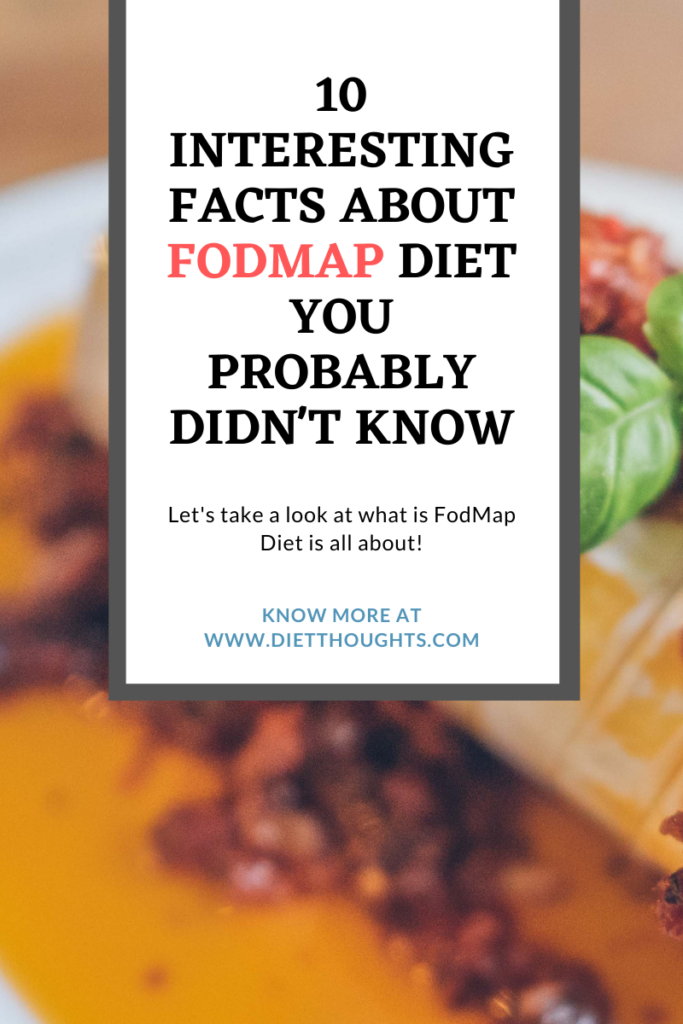Hi fellas! In this post, we are going to discuss the most interesting facts about the Fodmap diet.
We are also going to break down some of the most frequently asked questions and provide very detailed answers that will clear up any confusion you may have regarding it.
It is important for you to know that this diet shouldn’t be taken lightly, so before jumping further into this topic, do you know what FodMap stands for?
FODMAPs diet stands for–Fermentable Oligo-, Di- and Mono-saccharides And Polyols which are short-chain carbohydrates (sugars) that the small intestine absorbs poorly.
FODMAPs stands for Fermantable Oligo-, Di- and Mono- saccharides And Polyols
Some people experience digestive distress after eating them.1
So these are some important information on this diet:
1. It is a very precise diet
First and foremost, the Fodmap diet requires that you follow it precisely. It is complex and if you don’t strictly stick to the rules, it will not work.
The low Fodmap diet is focusing on avoiding certain food specifically in the carb group, which can cause intestinal distress such as bloating and abdominal pain.
2. The reason why it was invented
The Fodmap diet was invented by Dr. Sue Shepherd and Dr. Peter Gibson of the Department of Gastroenterology at Monash University in Australia in 2005.
They initially developed the Fodmap diet for Irritable Bowel Syndrome (IBS) sufferers in order to relieve their symptoms.2
3. Where it all started
The Fodmap diet was first introduced in 2006 by Dr. Sue Shepherd and Dr. Peter Gibson of the Department of Gastroenterology at Monash University in Australia.
It is quite a new diet, but there are already some great benefits from it. The term “Fodmaps” was first coined by researchers at the University of Newcastle – New South Wales in 2001, during research on irritable bowel syndrome.

4. Who can benefit from the Fodmap diet?
This diet is not meant for everyone. Unless you have experienced the symptoms of IBS. IBS sufferers can definitely benefit from the Fodmap diet as it is designed to minimize gut symptoms.
In fact, Dr. Sue Shepherd and Dr. Peter Gibson stated that this diet is the most effective for IBS sufferers and it helps them feel better in no time.
5. Falling into the “Fodmappetism”
There are many people who claim that they fall into the Fodmap group, but in reality, they don’t even have IBS as severe symptoms as those with real IBS.
They are also not actually suffering from any of the disorders associated with IBS, but rather they are suffering from intolerances to specific foods or food groups that have a strong impact on their intestines causing major gut symptoms such as pain, bloating, and diarrhea.
IBS is about bowel disorder, whereas lactose intolerance is enzyme-related issue that facing problem to digest dairy.
These two condition is not related.
People tend to confuse between these two as their symptoms are about the same.
6. How long should your Fodmap diet last?
When you follow the Fodmap diet, it is very important to remember that it is not a cure for IBS and cannot be used as such.
It can only be used as a dietary supplement and should always be combined with an IBS treatment plan.
7. Why bother following a Fodmap diet?
The reason why most people are given to follow this type of diet now is because of the new scientific evidence that has been published in recent years.
The results of this work have been published in a number of journal articles, which state that some foods may trigger symptoms in the intestines of many people.
Studies have shown that it is possible to get symptom relief through dietary changes.3
8. Remove lactose from your diet
The most important thing to do is remove lactose from your diet.
Lactose is the most common trigger of all Fodmap foods, and generally, people who are intolerant of lactose cannot tolerate any amount of milk or milk-based products.
In addition, they report symptoms when drinking dry wines and eating hard cheeses. People with lactose intolerance may experience symptoms such as bloating, diarrhea, stomach pain, and feeling sick.4
You can read more about lactose intolerance in another article.

9. Supplement with lactase enzyme
Lactase enzyme helps break down lactose (the “D” in FODMAPs) into its component sugars; glucose and galactose, and thus helps improve digestibility and absorption.
Lactase enzyme supplements are commonly available in caplets and drops (and are already added to lactose-free dairy products).
You can do this by taking 1-3 tablets per meal or adding 5-15 drops to one liter of milk and refrigerate for 24 hours before using.5
By following the low fodmap diet, digestive enzyme supplementation might help you to overcome the symptoms.
10. Why do you need to follow a diet?
Last but not least, should you follow this kind of diet?
Most people with intestinal bowel syndrome (IBS) usually experience few symptoms that may negatively impact their daily living.6
There is a study that showed the efficacy of this diet in reducing the IBS’s symptoms and later had improved the patient’s health status.7
Hence, by practicing a low Fodmap diet, it can reduce the symptoms and help them to improve their quality of life
That sums up our 10 interesting facts regarding the FodMap Diet. Now you can enjoy the best of this diet by following these simple guides.
See ya in the next post!
Learn something from this post? Drop your comment down below and let us know.
References:
1. Cunha, J. P. (2021, February 17). Low FODMAP diet for IBS: List of foods to eat and avoid. MedicineNet. https://www.medicinenet.com/low_fodmap_diet_list_of_foods_to_eat_and_avoid/article.htm
2. A short history of FODMAP diets. (2020, June 11). Everyday Nutrition. https://everydaynutrition.com.au/a-short-history-of-fodmaps/
3. Böhn L, Störsrud S, Liljebo T, Collin L, Lindfors P, Törnblom H, Simrén M. Diet low in FODMAPs reduces symptoms of irritable bowel syndrome as well as traditional dietary advice: a randomized controlled trial. Gastroenterology. 2015 Nov;149(6):1399-1407.e2. doi: 10.1053/j.gastro.2015.07.054. Epub 2015 Aug 5. PMID: 26255043.
4. Lactose intolerance. (2018, 10). nhs.uk. https://www.nhs.uk/conditions/lactose-intolerance/
5. Enzyme supplementation & the low FODMAP diet: Can it work for YOU? (2019, August 1). FODMAP Everyday. https://www.fodmapeveryday.com/enzyme-supplementation-and-the-low-fodmap-diet-can-it-work-for-you/
6. El-Serag HB. Impact of irritable bowel syndrome: prevalence and effect on health-related quality of life. Rev Gastroenterol Disord. 2003;3 Suppl 2:S3-11. PMID: 12775997.
7. Marsh A, Eslick EM, Eslick GD. Does a diet low in FODMAPs reduce symptoms associated with functional gastrointestinal disorders? A comprehensive systematic review and meta-analysis. Eur J Nutr. 2016 Apr;55(3):897-906. doi: 10.1007/s00394-015-0922-1. Epub 2015 May 17. PMID: 25982757.

